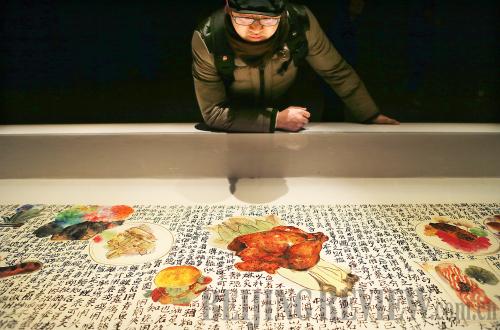|
 |
|
MIX-MASH: Paintings depict Chinese food at an art show in Beijing on December 8, 2012. The combination of different ingredients is an important part of traditional cooking culture (WAN XIANG) |
Scientific answer
Does ill-matched food really cause death?
In his February interview with the People's Daily, Ge Keyou, Honorary Chairman of the Chinese Society of Nutrition, says, "The theory is implausible. Scientists have conducted many experiments on this matter and found no evidence to support it."
As early as 1935, Zheng Ji, nutritionist and professor at Nanjing University, proved that there was no such thing as a toxic food combo by feeding research participants a variety of supposedly deadly combinations, including banana and taro, peanut and cucumber, green onion and honey, beef and chestnut, crab and persimmon, to no effect. A similar experiment carried out at Harbin Medical University proved the same.
"In terms of nutrition, there is no problem. But those suffering from disease or taking medicine should be mindful of what they eat," said Lin Yin, a medical scientist at Beijing University of Chinese Medicine. "A patient with hyperlipidemia should not eat food containing much fat, for example."
Fan Zhihong, a nutritionist at China Agriculture University, takes the same stance. "Rumor has it that eating mutton and water melon or chicken and chrysanthemum will lead to poisoning. But these foods are often eaten together and no one suffers."
The professor pointed out that people refrain from matching certain ingredients due to a reduction in nutritional value, even if no harmful effects have been detected as a result.
Food poisoning is another concern. It is often held that ingredients such as shrimp contain pentavalent arsenic compounds, which become toxic in reaction to Vitamin C. Generally speaking, ingesting more than 100 mg of arsenic is dangerous. On average, sea food contains merely 0.1 mg per kg. This means that even if a person ate 10 kg along with Vitamin C, he or she would not be poisoned, Fan explained.
So why do people often feel discomfort after eating ill-matched meals?
"In everyday life, some foods may cause stomachache or itchy skin. But this is mainly due to eating spoiled ingredients or cooking in unhygienic conditions," said Zhang Chunyan, Director of the Chinese Medicine Department at Shanghai Eastern Hospital. The doctor said she has never heard of a death caused by ill-matched food during her entire career.
Lin analyzed 163 kinds of so-called ill-matched ingredients that she divided into five categories. First, exotic food, different from traditional Chinese varieties; second, meat and sea food, rich in protein and easy to spoil, causing possible allergies; third, uncooked food; fourth, fermented food, such as pickled vegetables that can contain nitrite, and fifth, edible mushrooms, some of them poisonous if not cooked properly.
All food might cause discomfort if not properly cooked, but not due to ill-matching, she stressed.
"Food poisoning has little to do with combining the wrong ingredients," Zhang Chunyan explained, adding that some people are more sensitive to what they eat than others.
"The food theory is both misunderstood and exaggerated."
According to Fan, food can be divided into several groups including cold, mild and hot. For example, both crab and persimmon are cold, which can cause trouble if combined.
"I think the theory prevails because most people lack the necessary knowledge of traditional Chinese medicine," she argued. "Based on a one-sided experience, people blame food poisoning and various dietary discomforts on ill-matched food."
In the end, food experts agree on one thing: Everyone should follow a diet that is diverse, balanced and nutritional.
Email us at: baishi@bjreview.com | 